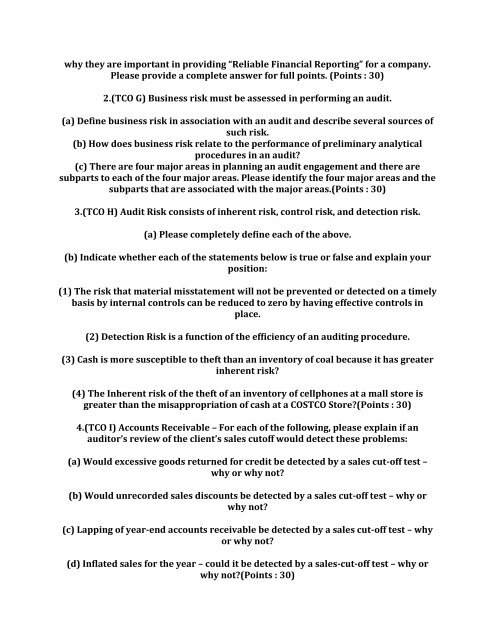DEVRY ACCT 555 Entire Course
You also want an ePaper? Increase the reach of your titles
YUMPU automatically turns print PDFs into web optimized ePapers that Google loves.
why they are important in providing “Reliable Financial Reporting” for a company.<br />
Please provide a complete answer for full points. (Points : 30)<br />
2.(TCO G) Business risk must be assessed in performing an audit.<br />
(a) Define business risk in association with an audit and describe several sources of<br />
such risk.<br />
(b) How does business risk relate to the performance of preliminary analytical<br />
procedures in an audit?<br />
(c) There are four major areas in planning an audit engagement and there are<br />
subparts to each of the four major areas. Please identify the four major areas and the<br />
subparts that are associated with the major areas.(Points : 30)<br />
3.(TCO H) Audit Risk consists of inherent risk, control risk, and detection risk.<br />
(a) Please completely define each of the above.<br />
(b) Indicate whether each of the statements below is true or false and explain your<br />
position:<br />
(1) The risk that material misstatement will not be prevented or detected on a timely<br />
basis by internal controls can be reduced to zero by having effective controls in<br />
place.<br />
(2) Detection Risk is a function of the efficiency of an auditing procedure.<br />
(3) Cash is more susceptible to theft than an inventory of coal because it has greater<br />
inherent risk?<br />
(4) The Inherent risk of the theft of an inventory of cellphones at a mall store is<br />
greater than the misappropriation of cash at a COSTCO Store?(Points : 30)<br />
4.(TCO I) Accounts Receivable – For each of the following, please explain if an<br />
auditor’s review of the client’s sales cutoff would detect these problems:<br />
(a) Would excessive goods returned for credit be detected by a sales cut-off test –<br />
why or why not?<br />
(b) Would unrecorded sales discounts be detected by a sales cut-off test – why or<br />
why not?<br />
(c) Lapping of year-end accounts receivable be detected by a sales cut-off test – why<br />
or why not?<br />
(d) Inflated sales for the year – could it be detected by a sales-cut-off test – why or<br />
why not?(Points : 30)


















